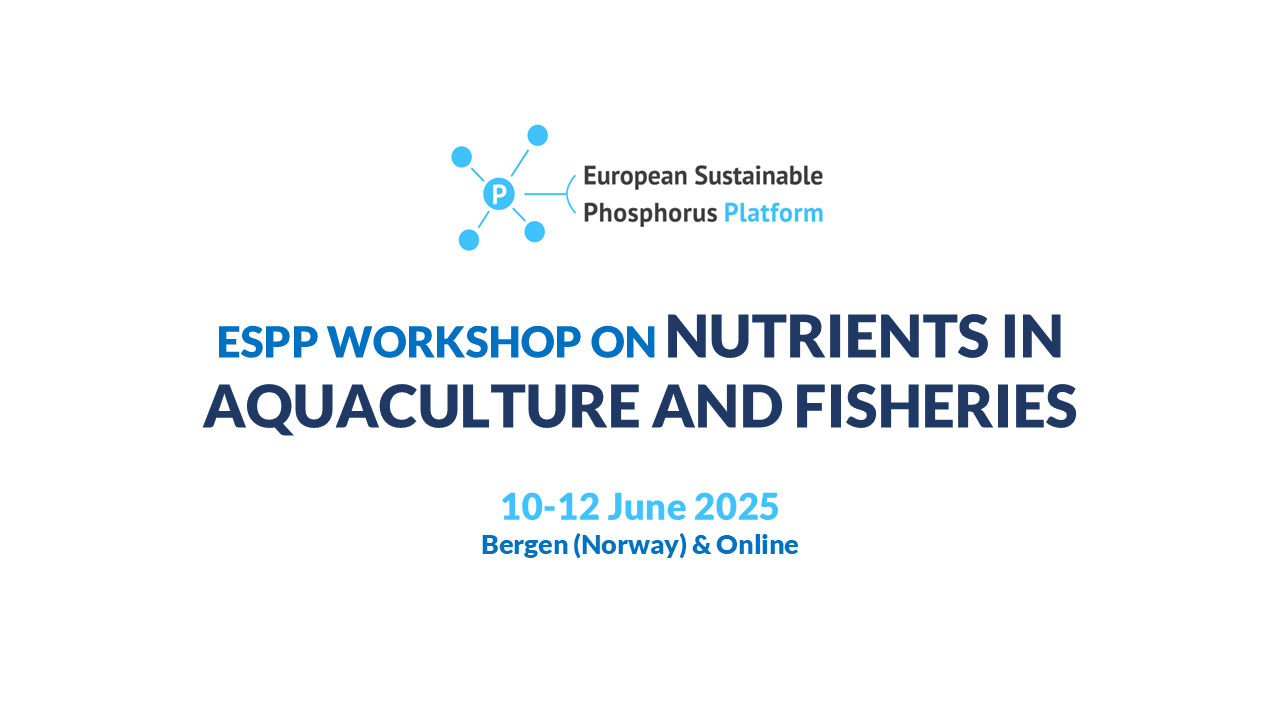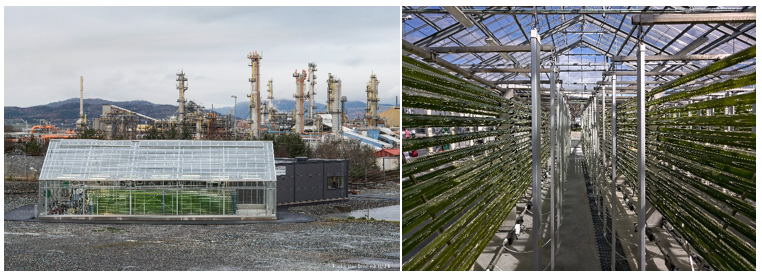 https://phosphorusplatform.eu/AquacultureFisheries
https://phosphorusplatform.eu/AquacultureFisheries
10-12 June 2025, Bergen (Norway) & online. ESPP workshop, with partners in Norway and with UNEP uPcycle, on nutrient management in aquaculture feed, seafood processing and fish sludge valorisation, Norway & online, covering nutrient flows, environmental best practice, phosphorus recycling, regulatory challenges. The workshop will contribute to the United Nations (UNEP) project uPcycle, leading to a UNEP white paper on phosphorus sustainability in aquaculture. Possible online connected meetings in Brussels, Chile. Site visits: state-of-the-art aquaculture, fish sludge processing installations.
If you would potentially contribute, please email indications of your organisation’s areas of interest, competence, possible content of presentation, to
Event location
Bergen (Norway) @ NORCE (Nygårdsgaten 112/114, 5008 Bergen) + online.
Outline programme
10 June 2025
| 13.30 – 14.00 | Registration and welcome coffee |
| 14.00 – 14.15 |
Opening and welcome by organisers (ESPP, NORCE, NCE Aquaculture, Ragn-Sells)
|
| 14.15 – 15.45 | Session I. Nutrient flows in aquaculture and fisheries, predicted growth, potentials for circularity and improved nutrient use efficiency; Nutrient sustainability as part of aquaculture sector sustainability vision and strategies (industry federations, leading salmon companies); Nutrient flows and recycling in seafood processing waste
|
| 15.45 – 16.15 | Coffee break |
| 16.15 – 18.00 |
Parallel session IIA. LCA, circularity business models
Parallel session IIB. Efficiency of use of nutrients in aquaculture feed – aquaculture feed and improved nutrient use efficiency, finding new sustainable feed protein sources as aquaculture grows and wild fish production (so processing by-products) recede, moving from fish-protein based to plant based feeds, possible use of facilitating products (phytase …)
|
| 19.30 | Networking dinner |
11 June 2025
| 8.30 – 9.00 | Registration and welcome coffee |
| 9.00 - 10.00 | Panel session with EU policymakers organised by Bellona |
| 10.00 - 10.30 | Coffee Break |
| 10.30 - 12.15 |
Parallel session IIIA. Aquaculture sludge recycling via algae, growing algae as fish feed
Parallel session IIIB. Recycling of aquaculture sludge – technical aspect: aquaculture sludge collection (onshore, offshore) and processing (biogas, cement kiln incineration, transformation to organic fertilisers, extraction of mineral nutrients …): examples of technologies, presented by technology suppliers and/or by user aquaculture operators
|
| 12.15 – 13.15 | Light lunch |
| 13.15 – 14.15 |
Session IV. Recycling of aquaculture sludge – regulatory challenges (Animal By-Products Regulation, EU Fertilising Products Regulation, Animal Feed regulations …) and policy opportunities; development of policy proposals – Europe, global
|
| 14.15 – 14.45 | White paper discussion, led by Will Brownlie, UK CEH |
| 14.45 – 15.00 | Closing |
| 15.30 – 17.00 | Visit to Marineholmen RASlab where there is RAS facilities (research) with salmon connected with microalgae cultivation. |
12 June 2025
9.00 Optional site visit to National Algaepilot Mongstad
Registration
Available on Eventbrite (registration for participating in Bergen closing on 6th June).
Site visits description
Marineholmen RASLab is a research and innovation company with a focus on Recirculating Aquaculture System (RAS) technology. With a central location in Bergen, and a state-of-the-art research facility, RASLab offers the opportunity for the investigation of sustainable, land-based fish farming. In the EU project INNOAQUA, RASLab is hosting the first stage of Demo #1: the integration of salmon production in RAS with microalgae production in a photobioreactor (PBR) at pilot scale, in a land-based IMTA (Integrated MultiTrophic Aquaculture) set-up. During the site visit, you will be given a tour of the whole facility and explain more about the research and show you 12 self-contained fresh or saltwater RAS systems. One of these is connected to a microalgae PBR from the partner NORCE, where the microalgae are continuously fertilized with the nutrient-rich effluent water from the RAS, producing valuable microalgal biomass while cleaning the water.
Note: this visit can only host 20 persons, due to limitations in the space and lay-out of the facilities! So be quick to sign up! The location is a 5 min walk from the venue where the workshop is held.
For more information, please contact Dorinde Kleinegris:

The National Algaepilot Mongstad is a state-of-the-art research facility dedicated to the development and demonstration of sustainable production processes of microalgae (TRL 5-6), as well as for the production of large quantities (100’s of kilos) of microalgal biomass for further testing and development of new products (food, feed, chemicals). For example, in the INNOAQUA project, around 200 kg of microalgal paste of three different microalgae strains were produced, that are now tested in a biorefinery approach to extract various ingredients (e.g., omega-3 rich oils, proteins, pigments) that are used for food formulation. The facility consists of a greenhouse with various types of photobioreactors, and a basic laboratory and office as well as the related infrastructure (water treatment, harvesting equipment) in the annex, and is owned by the University of Bergen, and operated in close collaboration with NORCE. During the visit, you will have the opportunity to tour the facilities, and gain insights into our research initiatives and technological advancements.
The facility is located at industry park Mongstad, approximately one hour north-west from Bergen. We will travel to the facility by bus, leaving at 09h00 from Marineholmen (Thormøhlensgate 55, 5006) in Bergen, back around 12h30. Fare for the visit is 20€.
For more information, please contact Dorinde Kleinegris:

- Additional, pending confirmation. Visit to:
- pilot fish sludge collection installation
- anaerobic digestion of fish sludge
